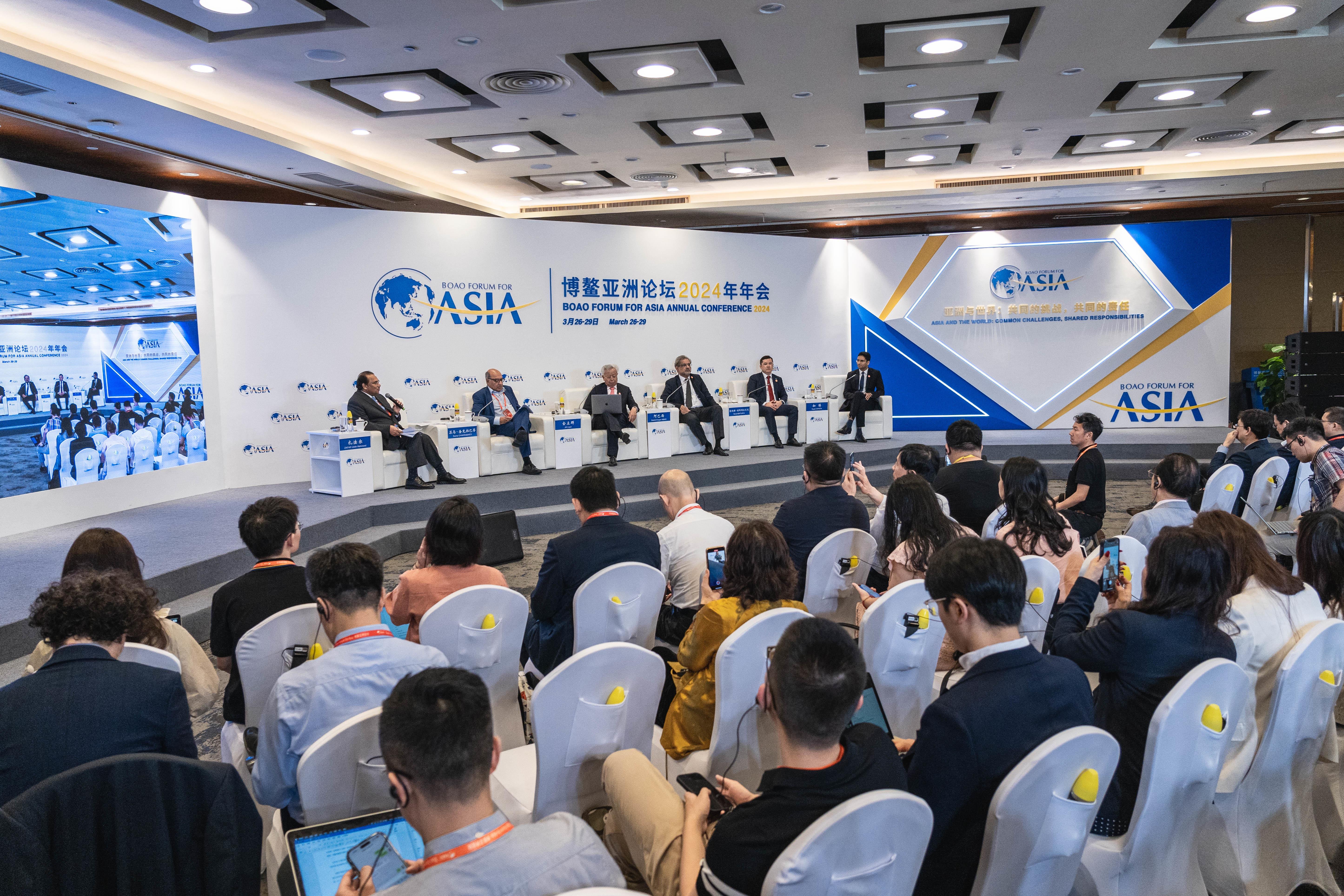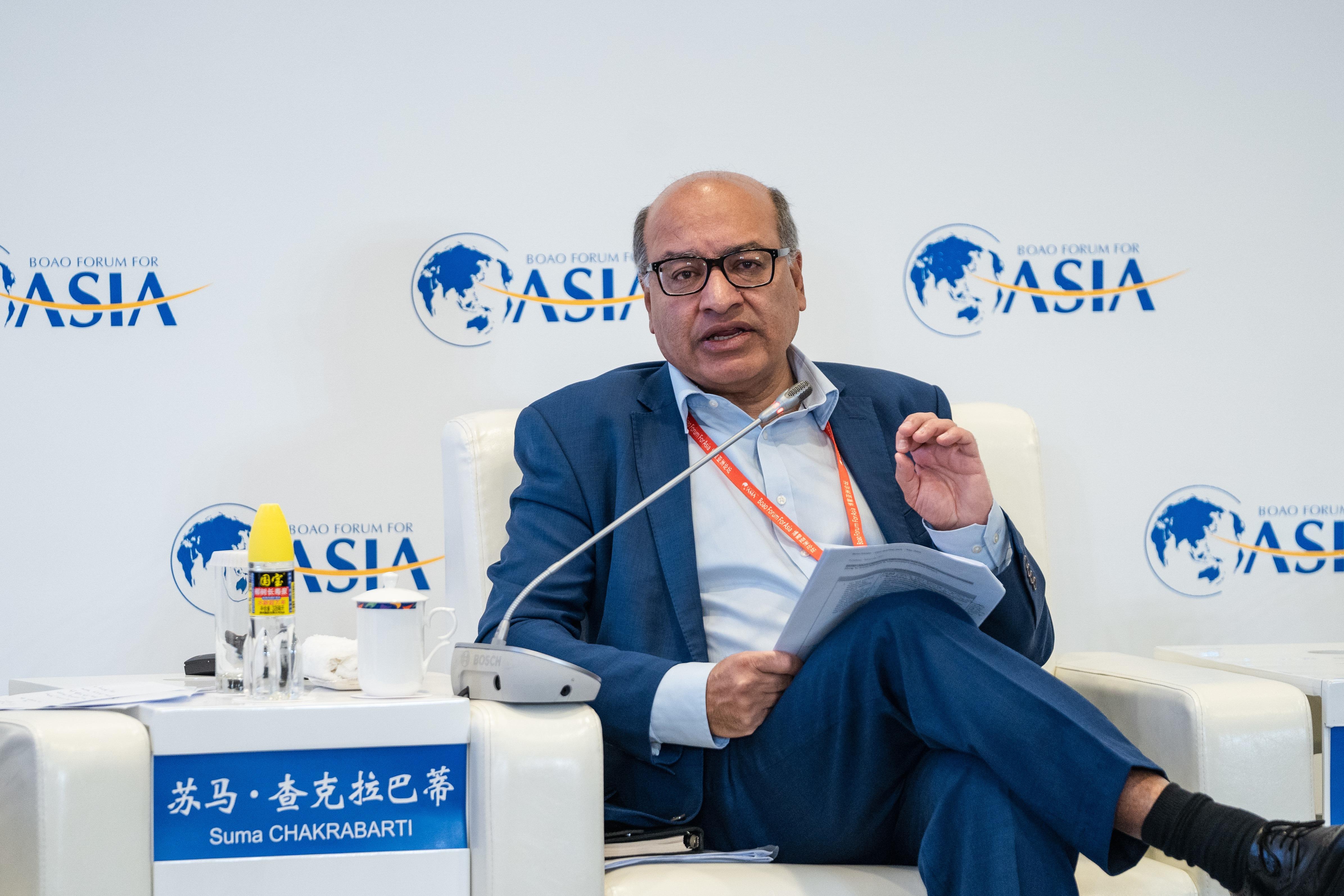 A discussion panel on high-quality Belt and Road Cooperation is underway, at the Boao Forum for Asia Annual Conference 2024 in Hainan province, China, March 29, 2024. (PHOTO / XINHUA)
A discussion panel on high-quality Belt and Road Cooperation is underway, at the Boao Forum for Asia Annual Conference 2024 in Hainan province, China, March 29, 2024. (PHOTO / XINHUA)
International political and financial leaders said countries participating in the Belt and Road Initiative (BRI) should engage deeper in BRI projects in order to achieve high-quality development together.
The leaders were speaking at a discussion panel titled “Supporting High-Quality Belt and Road Cooperation” at the Boao Forum for Asia Annual Conference 2024 in Hainan province, China.
They said that to propel the initiative’s high-quality development, several crucial measures need to be undertaken, such as encouraging more action from participating countries, respecting national strategies of different countries, fostering green development, and promoting digital advancement.
The BRI, which was first proposed by China in 2013, aims to build a trade and infrastructure network connecting Asia with Europe, Africa and beyond.
Jin Liqun, president and chair of the board of directors of the Asian Infrastructure Investment Bank (AIIB), said it is important to recognize that China is not the sole contributor to the BRI. Other countries also play a significant role in implementing projects and investing money. Also, the benefits derived from the BRI are mutually advantageous for all participating nations, not only to China.
Suma Chakrabarti also highlighted Hong Kong’s ability to mitigate the risks of these projects, with various well-established financial instruments and mechanisms
Jin noted that the completion of one project marks just the beginning of what could be a long-term endeavor that spans several decades.
To ensure these projects’ maintenance, local involvement, engagement, and ownership are important, he said.
Suma Chakrabarti, chair of the ODI Board of Trustees and former president of the European Bank for Reconstruction and Development, said it was a wise choice for the bank to join the initiative 10 years ago.
More is expected to come as now that the BRI is entering a new phase — which requires a more detailed and economically viable plan for developing economies, Chakrabarti said.
He suggested that countries receiving funds for infrastructure projects should be proactive in their design, formulation and implementation.
Chakrabarti also highlighted Hong Kong’s ability to mitigate the risks of these projects, with various well-established financial instruments and mechanisms. These mechanisms can serve as valuable models for other cities in the Guangdong-Hong Kong-Macao Greater Bay Area and beyond to participate in the BRI, Chakrabarti said.
 Suma Chakrabarti, former president of the European Bank for Reconstruction and Development, speaks during a discussion panel on high-quality Belt and Road Cooperation, at the Boao Forum for Asia Annual Conference 2024 in Hainan province, China, March 29, 2024. (PHOTO / XINHUA)
Suma Chakrabarti, former president of the European Bank for Reconstruction and Development, speaks during a discussion panel on high-quality Belt and Road Cooperation, at the Boao Forum for Asia Annual Conference 2024 in Hainan province, China, March 29, 2024. (PHOTO / XINHUA)
Reducing project risks is a crucial prerequisite for encouraging private-sector participation in BRI, he said.
Also emphasizing the participation of private sector and capital, Renat Bekturov, governor of Astana International Financial Centre, said the profitability of BRI projects can drive the participation of private sector and capital. BRI projects can also benefit from innovative financing and diversified funding sources to achieve high-quality development.
Rupak Sapkota, the foreign affairs advisor to the prime minister of Nepal, said that to inject new momentum into the BRI, each country’s unique development strategy should be respected.
Shahid Khaqan Abbasi, former prime minister of Pakistan, said that inclusiveness is the foundation of the BRI, and to promote its high-quality development, projects must be economically viable and environmentally sustainable
Sapkota cited his own country as an example, saying that with its mountainous terrain and vulnerability to climate change, Nepal has set a goal to achieve sustainable development by 2026. Hence, it is crucial to consider Nepal’s unique situation when implementing the BRI projects within the country, he said.
It is also important to recognize that smaller or less-developed countries in the global south may face hardships in undertaking large flagship projects. Hence, BRI can help them launch small and medium-sized projects at first. By implementing projects that align with the capacities of these countries first, their ability to undertake larger-scale projects can be enhanced gradually, Sapkota said.
Echoing Sapkota, Shahid Khaqan Abbasi, former prime minister of Pakistan, said that inclusiveness is the foundation of the BRI. To promote its high-quality development, projects must be economically viable and environmentally sustainable.
In addition, high-quality BRI projects require transparency, and their funds should be utilized for their intended purpose in order to combat corruption.
Furthermore, to address the challenges posed by scientific and technological developments, the initiative should actively co-construct the process of digitalization.
Fostering digital innovation can help countries participating in the BRI improve their digitalization and help the global enhancement of AI technology integration, Abbasi said.


